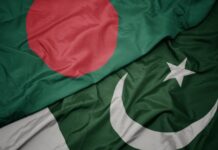A banned Islamist extremist party Tehreek-e-Labbaik Pakistan (TLP) agreed to suspend its long march to Islamabad from Lahore on Sunday after the Pakistani government announced that it would consider expelling the French ambassador from Pakistan and drop charges against the party’s leader Saad Rizvi.
Rizvi was arrested in April this year during demonstrations against the publication in France of caricatures of Islam’s Prophet Muhammad. Pakistan at that time had refused to expel the French ambassador and instead banned the TLP under the country’s anti-terrorism laws.
“The issue of expelling the French ambassador will be taken to parliament for debate,” Interior Minister Sheikh Rashid Ahmed said, adding that the government would drop charges against TLP chief Saad Rizvi and release those arrested at protests in support of Rizvi.
In return, the TLP agreed to stop the march but said supporters would continue a sit-in at the town of Muridke — near Lahore — until the Pakistani government delivers its promises. It was unclear when Rivzi would be released.
Earlier, at least two policemen died in clashes in Lahore in a bid to stop the marchers, Pakistani authorities said, adding that at least a dozen officers were injured and several police vehicles were torched. Some police vehicles were also seen hijacked by the extremist group.
On the other hand, the TLP spokesperson Saddam Bukhari said “at least seven” of its supporters died in the clashes, and that hundreds more were injured in clashes with police.
The TLP gained prominence as a “blasphemy brigade” in Pakistan in 2017, in an anti government protest allegedly engineered by the Pakistani military to undermine the then civilian government of Nawaz Sharif, who now lives in exile in London.
Pakistan’s military establishment is known to have close ties to Islamist groups in the country and the region and is known for regularly using them to settle its scores with rivals at home and abroad.
These latest protests come at a time when civil-military relations in Pakistan are worsening due to a dispute between Pakistan’s Prime Minister Imran Khan with his army chief General Qamar Bajwa over the selection of the next chief for Pakistan’s spy agency the ISI. Some feel that there maybe a connection. Others have pointed out that it could be linked to the international monetary watchdog Financial Action Task Force (FATF) recent meet in Paris, France, where it was decided that Pakistan must continue to remain on a “grey-list” for not doing enough to prosecute known terror groups and their leaders residing in the country.
Pakistan is home to at least 12 US-designated ‘foreign terrorist organisations’, according to a new bipartisan US Congressional report.
Will the world silently watch as Pakistani military continues to play with fire, radicalizing its 200 million population in the name of Islam for its personal gains?
